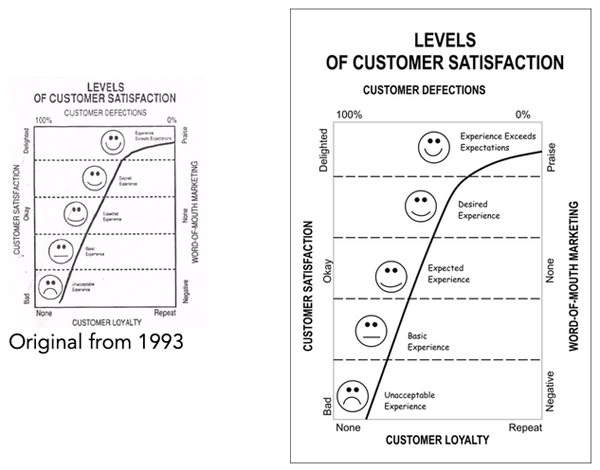
Vol. XIX, No. 2, February 2019
- Editor's corner
- Two of our continuous long-term clients
- The first Instagram food photos
- What's old is still relevant
- North American movie theater attendance trends
- Committed consumption impacting out-of-home entertainment
- Rise in visits to non-traditional experiential food & beverage venues
- Gentrification of out-of-home entertainment
- The mindful low- and no-alcoholic trend
- Changes in educational attainment
What's old is still relevant
The first issue of our Leisure eNewsletter was published 17 years ago in December 2001. Before then we had a printed newsletter named Leisure & Learning Alive that we snail-mailed out. An industry marketing and consulting colleague, Sheryl Bindelglass, was recently going thru her files and ran across a 1993 copy of that newsletter that included a graphic she scanned and shared with us. The copy wasn't great, so we had it recreated.

It's amazing how 25 years later, the basics are still the same. We're still focused on trying to satisfy customers to stay competitive.

Offering an excellent customer experience to satisfy customers requires focusing on the details. Conrad Hilton, Founder of the Hilton hotel chain, at a gala celebrating his career, was asked, “What were the most important lessons you learned in your long and distinguished career? He answered, “Remember to tuck in the shower curtain inside the bathtub. You get 'em in the door with location, location, location - and gorgeous appointments. You keep 'em coming back with the tucked in shower curtain.” In other words, customer satisfaction is achieved by paying attention to the details.
The truth is that most businesses, including most community-leisure venues (CLV) and family entertainment centers (FEC), fail to even meet expectations and satisfy customers. As Sheryl, who does a lot of marketing consulting for CLVs says, you can succeed by just being “brilliant at the basics.”
Back in 2013 we wrote an article, Exceeding customer expectations; the unachievable myth, that basically said the same thing.
Jim Kessler, owner of the highly successful Lasertron in Buffalo, NY, once wrote us and said that customers don't really want remarkable service. “She or he just wants to receive what they expected, and they are thrilled when they get it - especially if they get it every single time they visit... You can't find managers and staff members who can provide remarkable customer service even 10% of the time, let alone 100%.”
Jim went on to say, “If a business provides the minimum expected by the customer 99.99% of the time, it will crush any competitor who focuses on trying to achieve remarkable service 100% of the time (which is impossible).” Jim believes that when most people think they received remarkable customer service, they actually only received what they expected and were surprised when they received it. In other words, receiving basic decent customer service exceeds most peoples' expectations.
There's another strategy to help meet customers' expectations. It's not setting their expectations too high to begin with. Often businesses hype their offerings in their marketing and advertising and set unachievable expectations. Then, when they can't deliver what they promised, customers are disappointed and dissatisfied. Conversely, if their expectations had not been set so high or if they had gone in without any expectations, they would have been at least satisfied. Never make promises that you can't consistently deliver. Rather than investing heavily in advertising and marketing, you are far better off investing in quality staff and training to deliver a consistent and acceptable experience to the customers you already have. Those customers will then through word-of-mouth, mostly eWOW, take care of your marketing for new customers.
Vol. XIX, No. 2, February 2019
- Editor's corner
- Two of our continuous long-term clients
- The first Instagram food photos
- What's old is still relevant
- North American movie theater attendance trends
- Committed consumption impacting out-of-home entertainment
- Rise in visits to non-traditional experiential food & beverage venues
- Gentrification of out-of-home entertainment
- The mindful low- and no-alcoholic trend
- Changes in educational attainment


